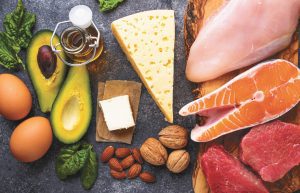By Colin E. Champ, MD, CSCS – Radiation Oncologist


Early research on diet and cancer risk did suggest a link to fat consumption. How else could we explain why regions with low/healthy fat intake – for example, Asia and the Mediterranean – also have lower cancer rates than countries with higher-fat diets (U.S.). After years and multiple attempts to link dietary fat and cancer, however, studies remain negative. It appears it’s not fat itself that increases your cancer risk, but what kind of fat and its role in your overall diet.
So what does today’s science tell us about dietary fat in the big picture of healthy eating choices to help prevent cancer?
• Avoid processed meat like bacon, ham, salami, hot dogs and frankfurts. Processed meat is a Group 1 carcinogen, which means it causes cancer. Other Group 1 carcinogens are cigarette smoking and asbestos, to emphasize just how bad processed meats are to our bodies.
• Manage weight gain. Obesity is a very real concern for cancer risk and a cause of at least 13 cancers. Fat is the most concentrated source of calories, so if most of the foods you eat are high in fat, it’s simple for even small portions to add up to excess calories.
• Worry about trans fat. These fats are commonly used in processed and fast food such as cookies, crackers, snack foods, fried foods, and pastries. Trans fats are used in food processing because they give foods desirable taste and texture. Trans fats are directly connected to heart disease and more recently to prostate, colorectal, and breast cancers.
• Moderate fat intake. Eating fat won’t necessarily make you fat. But, if you consume too much fat, your body will create new fat cells/tissue to store the excess. While it’s not proven that fat causes cancer, we do know that it provides nutrients and promotes blood vessel formation to cancer cells, feeding their size and spread.
• Exercise. Muscle is an antidote to cancer. Making muscle through exercise reduces cancer-promoting sugar and insulin within our bodies; decreases levels of hormones that, over a prolonged period, can lead to cancer; and decreases inflammation, which serves as a fertilizer for cancer.
Removing fear of fat does not mean giving a thumb’s up to all high-fat foods. Focus on overall quality of foods you eat to promote health and reduce cancer risk.
Dr. Colin Champ, MD, CSCS
Dr. Colin Champ, MD, CSCS, is a radiation oncologist with board certifications in radiation oncology and integrative and holistic medicine. Dr. Champ is a certified strength and conditioning specialist, and his research interests include the prevention and treatment of cancer with lifestyle modification, including exercise and dietary modification.
Inspireem Exercise Medicine
239.429.0800
www.Inspireem.com
3555 Kraft Road, Suite 130, Naples, FL 34105
 Southwest Florida's Health and Wellness Magazine Health and Wellness Articles
Southwest Florida's Health and Wellness Magazine Health and Wellness Articles

